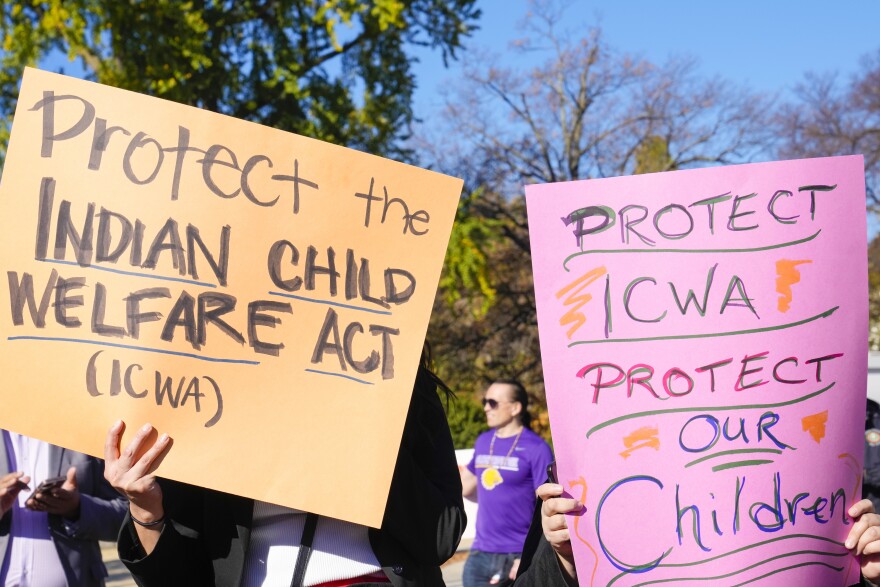Some states are working to enshrine their own versions of the federal Indian Child Welfare Act ahead of the anticipated U.S. Supreme Court decision that could overturn the policy. But Utah isn’t one of them.
Utah attempted to pass a state version of the policy during the 2023 legislative session, but the bill never received a House vote.
Passed by Congress in 1978, ICWA prioritizes placing Native American children with biological family members instead of referring them to adoptive or foster homes. It was a response to Indigenous children being removed from their homes and placed with non-Native families or in government-run boarding schools.
Utah’s bill would have established similar protections, and Indigenous leaders from the state’s eight federally recognized tribes urged the Legislature to pass it. State leaders advocated for its passage, too, including Republican Gov. Spencer Cox, Lt. Gov. Deidre Henderson and the Utah Attorney General’s Office. Attorney General Sean Reyes even joined a bipartisan amicus brief encouraging the U.S. Supreme Court to uphold the federal policy.
When Heather Tanana, a Navajo Nation citizen and research assistant at the University of Utah law school, discovered the Legislature was considering an ICWA bill, her initial thought was “it’s about time.”
She said the discussion has been going on for years, but 2023 was the first time a Utah-specific ICWA bill was actually introduced.
“I think everyone in the community had really high hopes about the ICWA bill passing. And just the way it really puttered out like that, despite such wide support, was just heartbreaking,” Tanana said.
Darren Parry, a council member of the Northwestern Band of the Shoshone Nation, was one of those people who had high hopes the bill would be given the green light. He said he lobbied for days for lawmakers to give it a yes vote.
But it never happened.
“I felt like someone just punched me in the gut,” he said. “It’s something easily done to protect Native American children that, you know, I think we dropped the ball and failed to do.”
He said there are huge benefits, including keeping Native American children “in their culture and heritage” where they can learn the “values and traditions of their people.”
Parry said he’s never received a clear answer as to why lawmakers didn’t want to vote on the bill. The number one thing he heard was “Why create a bill when we don't think the Supreme Court is going to strike it down?”
But Parry and Tanana aren’t confident the Supreme Court will uphold ICWA. To Parry, a state version of the law was “a plan B in place in case the unthinkable happened on the federal level,” and “the state statute would just kick in and take over and we wouldn't miss a beat.”
He also proposed the creation of a state ICWA trigger law that would take effect if the highest court ruled to overturn the federal act.
Parry expects the Utah bill will “absolutely” return in 2024, but it’s unclear if Republican Rep. Christine Watkins will sponsor it again. She declined KUER’s interview request.
Tanana believes a “disconnect” exists between the Legislature and the advocates helping draft the legislation.
“The people who are on the ground actually doing child welfare work, we're all in support of the state law because they saw that the federal law worked or that at least was something to protect kids,” she said.
Now, Tanana said it’s a waiting game. And she believes a reversal of ICWA without a state safeguard could cause a lot of problems.
There is still a disproportionate number of Native children being removed from their homes and placed with non-Native families in Utah. According to the Utah Division of Child and Family Services, nearly 6% of Utah children who were removed from their homes in 2022 were Native, despite Native Americans making up 1.6% of the state population.
“There is a concern that if the federal protection goes away, that Utah will get even worse,” Tanana said.
If the Supreme Court shoots down the national policy on the basis that the law favors a certain race, Tanana said it could also jeopardize other federal programs that support Indigenous families. Tanana said the Utah Division of Child and Family Services has a memorandum of understanding with the Indigenous nations in Utah, which lays out practices like who the division should contact within the tribe when a Native child enters the state welfare system. There are also policies in place that would allow the division to transfer cases from state court to tribal court.
“Again, if federal protection goes away, will those policies still remain in place? I don't know,” she said.






